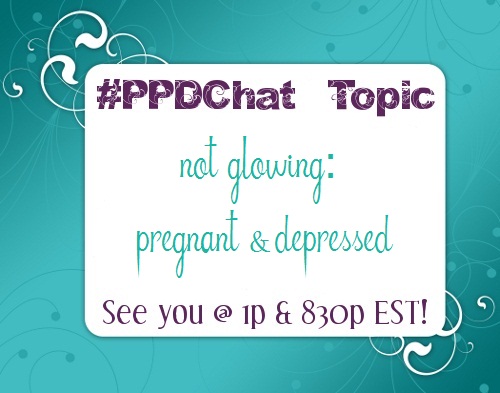Tag Archives: Antenatal Depression
Postpartum Voice of the Week: @mooshinindy
 Happy. Glowing. Ecstatic. Overjoyed. Thrilled. Sparkling. Beside herself with glee.
Happy. Glowing. Ecstatic. Overjoyed. Thrilled. Sparkling. Beside herself with glee.
Glum. Dark. Frustrated. Angry. Irritated. Depressed. Guilty. Scared. Anxious.
Which group of the above words do you expect to hear when the words “pregnant woman” hit your ears?
I am willing to bet it’s the first group. Not the second group.
More often than not, you would be right. But sometimes? Sometimes we aren’t sparkling. Sometimes we’re buried in mud and wishing for a hole to climb in somewhere until it is all over. Sometimes? Pregnancy goes way beyond the every day annoyances. Sometimes it takes a huge emotional toll.
I struggled with depression during my second pregnancy and during the first half of my third pregnancy. It sucked. There I was – pregnant. The very essence of survival hanging out in my uterus – and yet.. and yet… I couldn’t muster a smile. I did not want my child. I prayed for the doctor to not find the heartbeat with out third. Because then it would go away. It would all be a dream. Instead of a rollercoaster car clattering uphill for the downhill I was certain would follow delivery.
After our second, I fell into the worst Postpartum hell I have ever known.
After my third? I had picked up the pieces, surrounded myself with support, and advocated for myself. Thankfully, I was fortunate to not experience Postpartum after my third. (A statistical miracle, I was told by Dr. Jeffrey Newport)
Today’s Postpartum Voice of the Week offers up her insight into a subsequential pregnancy after Postpartum Depression. Kudos to her for sharing it so openly.
Thank you.
Validation of the EPDS in Mainland China for antenatal women
Through research, the Mainland Chinese version of the Edinburgh Postnatal Depression Scale has been validated.
What does this mean?
It means the EPDS is now a valid tool practitioners available for use in the Chengdu region of China to identify pregnant mothers struggling with depression.
More research is needed to validate it for postnatal women. The overall prevalence of antenatal depression was at about 4.7%. Two studies were conducted: One to measure stability, the other to measure sensitivity. Both passed with flying colours.


